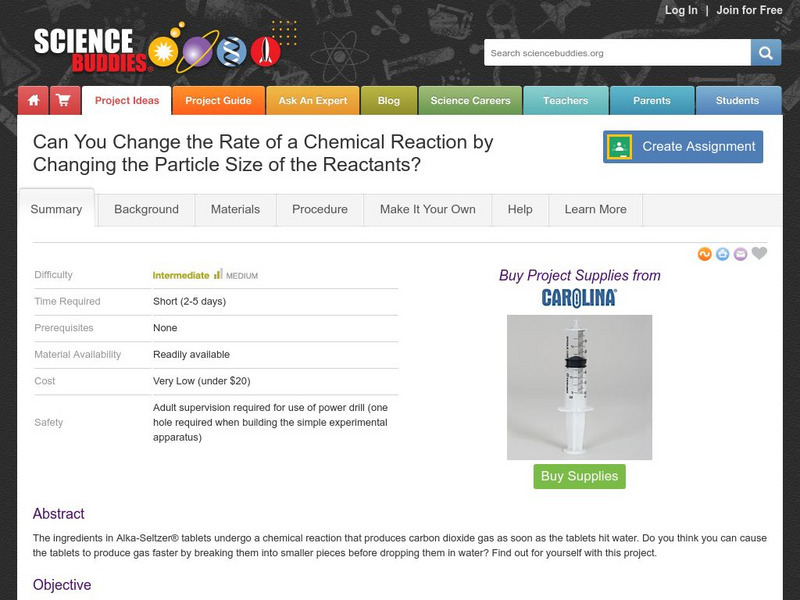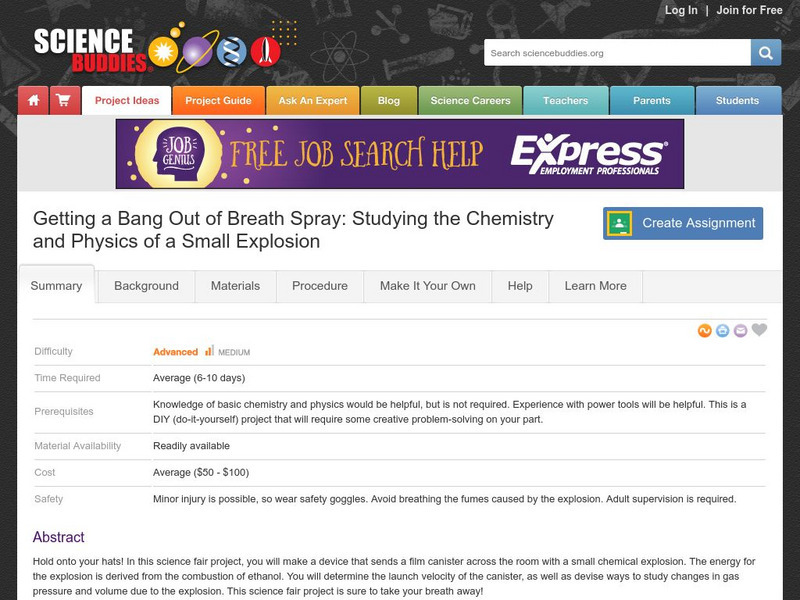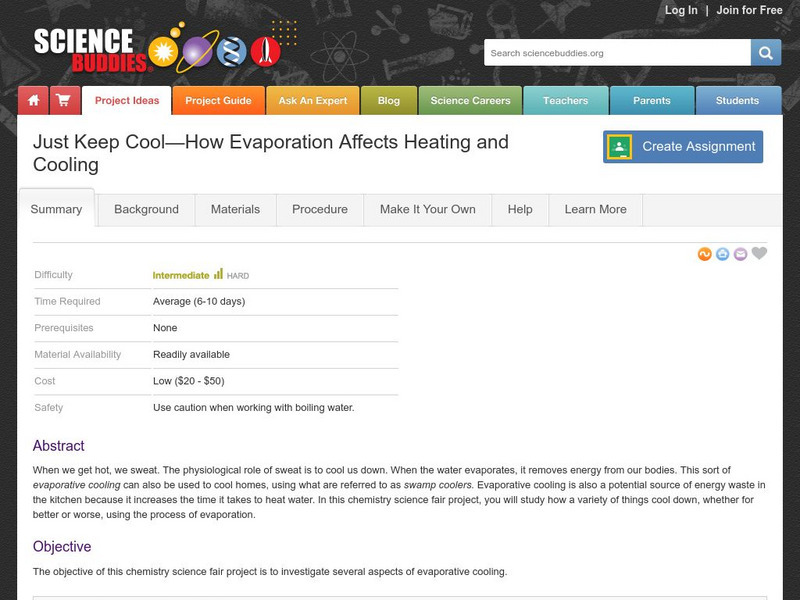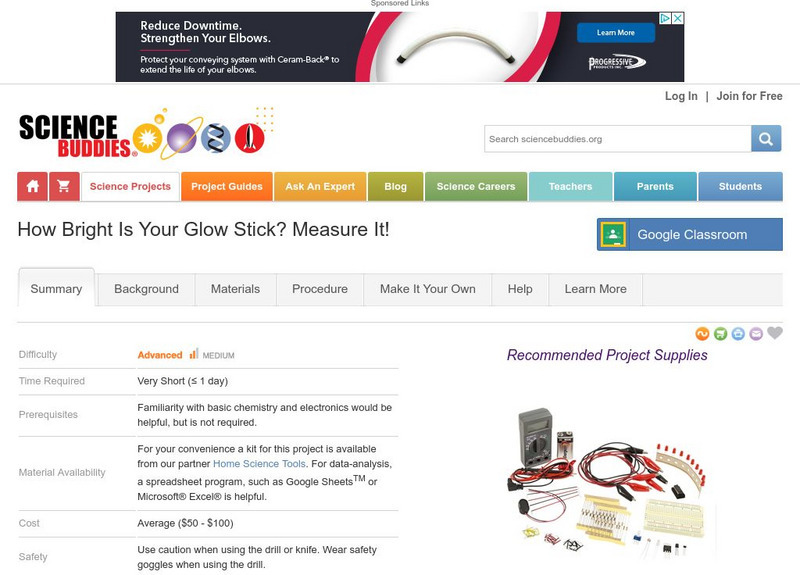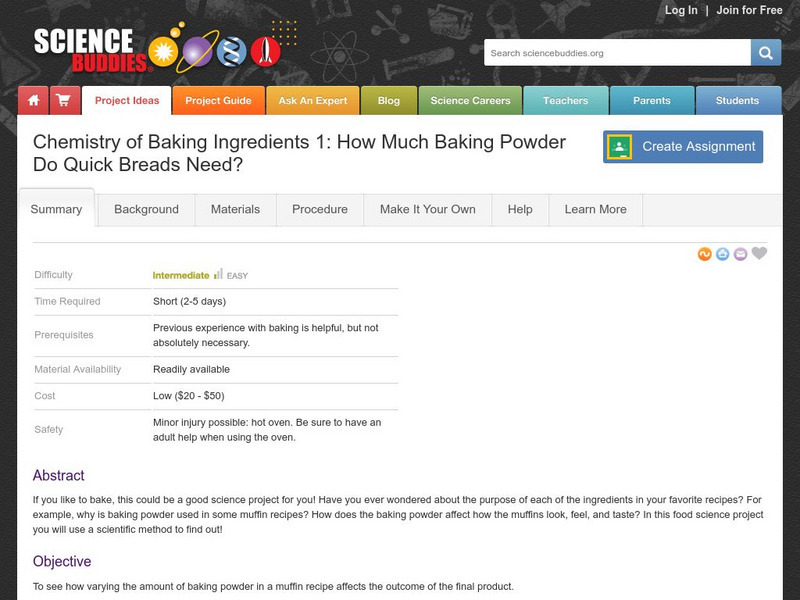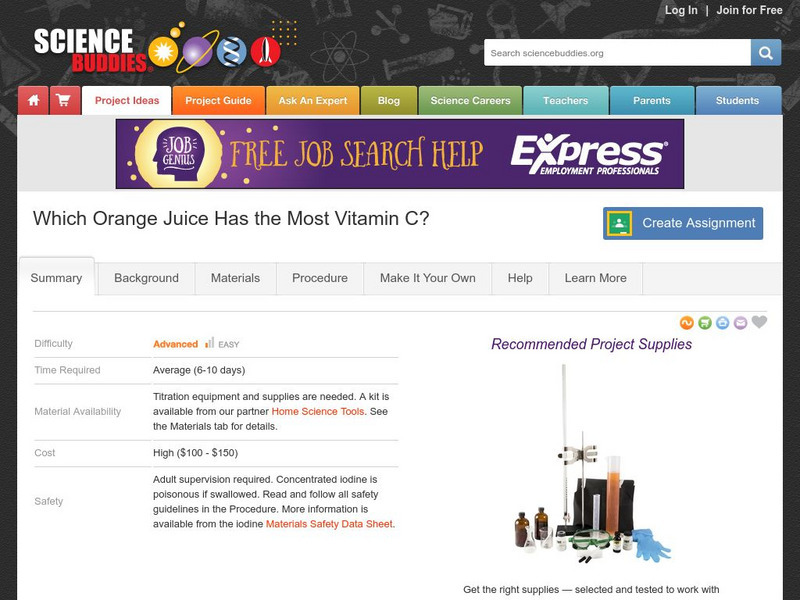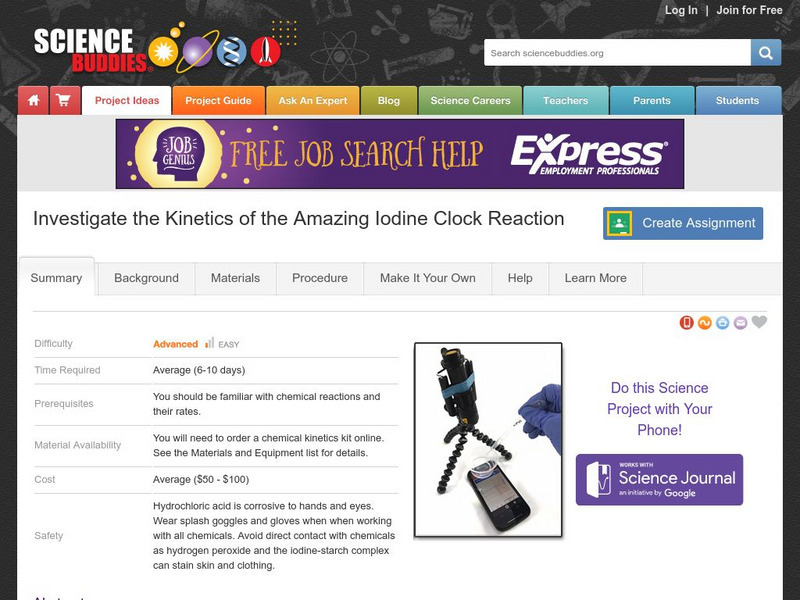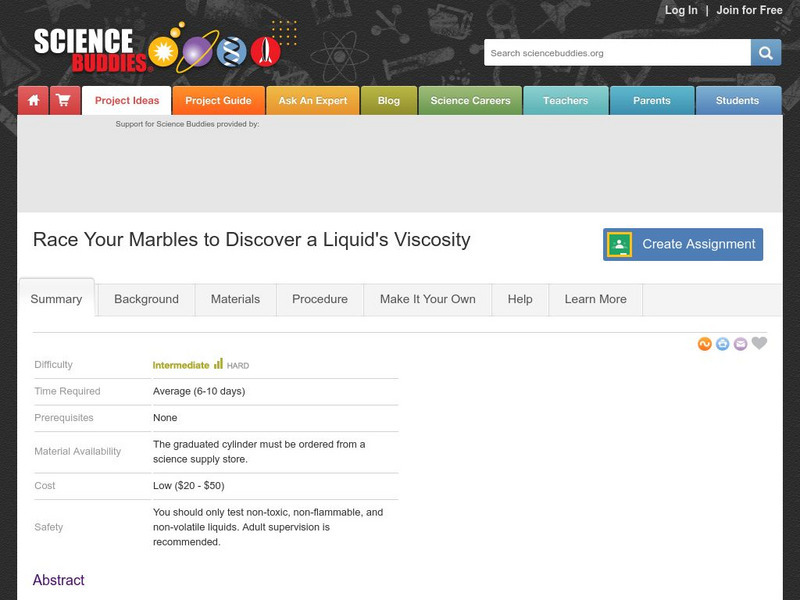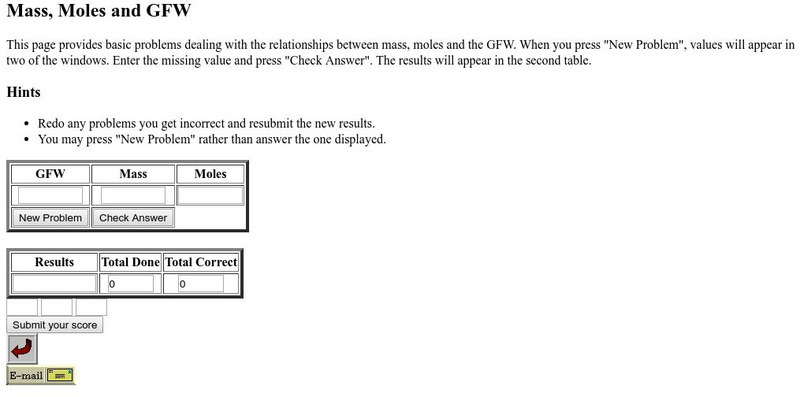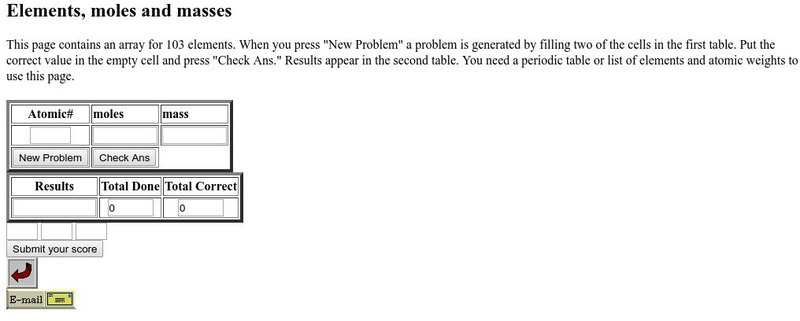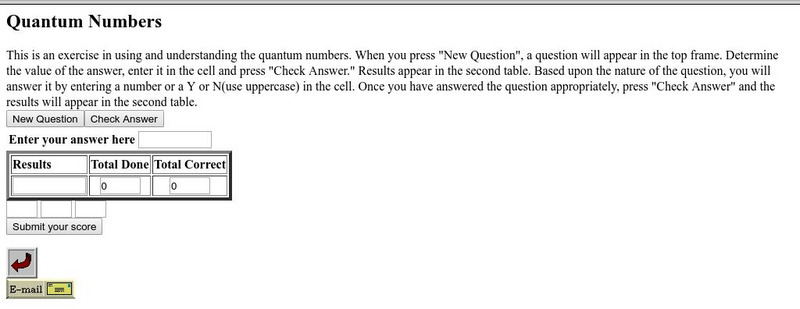Science Buddies
Science Buddies: Big Pieces or Small Pieces: Which React Faster?
Use an Alka-Seltzer to find out how size of a particle affects the speed of a chemical reaction. The Science Buddies project ideas are set up consistently beginning with an abstract, objective, and introduction, followed by a section on...
Science Buddies
Science Buddies: Can You Change the Rate of a Chemical Reaction?
The ingredients in Alka-Seltzer tablets undergo a chemical reaction that produces carbon dioxide gas as soon as the tablets hit water. Do you think you can cause the tablets to produce gas faster by breaking them into smaller pieces...
Science Buddies
Science Buddies: Saturated Solutions: Measuring Solubility
Many essential chemical reactions and natural biochemical processes occur in liquid solutions, so understanding the chemical properties of liquid solutions is fundamentally important. This project will challenge you to discover how much...
Science Buddies
Science Buddies: Can Baking Soda Substitute for Baking Powder in a Recipe?
There's nothing quite like the smell of fresh-baked muffins for breakfast on a Saturday morning. If you're into baking, you might want to try this insightful project that lets you witness the chemistry behind making muffins. You'll get...
Science Buddies
Science Buddies: Build a 'Breath Spray Bomb' to Study Small Explosion
Hold onto your hats. In this science fair project, you will make a device that sends a film canister across the room with a small chemical explosion. The energy for the explosion is derived from the combustion of ethanol. You will...
Science Buddies
Science Buddies: Make Your Own Markers
Do you ever wonder how markers are made? Where do all of those colors come from? Many of the colorful dyes we use come from plant pigments. Pigments are what make the world around us so colorful. How do chemists turn those natural plant...
Science Buddies
Science Buddies: Just Keep Cool How Evaporation Affects Heating and Cooling
When we get hot, we sweat. The physiological role of sweat is to cool us down. When the water evaporates, it removes energy from our bodies. This sort of evaporative cooling can also be used to cool homes, using what are referred to as...
Science Buddies
Science Buddies: How Bright Is Your Glow Stick? Measure It!
Objects that glow in the dark hold a special place in the imagination of both children and adults. The lights go out at night, but these odd things refuse to disappear. Where does the light come from? Do they work in any climate? In this...
Science Buddies
Science Buddies: How Much Baking Powder Do Quick Breads Need?
If you like to bake, this could be a good project for you. There is a purpose for each of the ingredients in your recipes, but not everyone is always aware of what that purpose may be. Though this lab takes multiple days, you will...
Science Buddies
Science Buddies: Do Oranges Lose or Gain Vitamin C After Being Picked?
Are oranges highest in vitamin C when they are fresh from the tree (or, in a pinch, the grocery shelf)? In this project you'll learn how to measure the amount of vitamin C in a solution using an iodine titration method.
Science Buddies
Science Buddies: The Science of Making Cheese!
Oooey gooey cheese - yum. Who doesn't like a slice of warm pizza straight from the oven? There's nothing quite like a slice of pizza and a glass of milk, so what makes pizza so great? The cheese. But did you know that making cheese is...
Science Buddies
Science Buddies: Which Orange Juice Has the Most Vitamin C?
In this project you'll learn how to measure the amount of vitamin C in a solution using an iodine titration method. You will hypothesize which juice will contain the most vitamin C, and then compare the amount of vitamin C in three...
Science Buddies
Science Buddies: Put Some Energy Into It! Use a Calorimeter to Measure
In this science fair project, use a calorimeter with an attached heating element to measure how water responds to added thermal energy.
Science Buddies
Science Buddies: Investigate the Kinetics of the Amazing Iodine Clock Reaction
In this science fair project, investigate the chemical kinetics of the famous iodine clock reaction. This classic experiment requires about a week to complete.
Science Buddies
Science Buddies: Race Your Marbles to Discover a Liquid's Viscosity
How do you like your mashed potatoes? Thin and whipped smooth? Or thick and mashed into chunks? Your mouth checks out not just the taste of your food, but its viscosity, or how it flows on your tongue, every time you take a bite. In this...
Science Buddies
Science Buddies: Using Pennies to Test How P H Affects Copper Corrosion
In this science fair project, use a color-based reaction to test how pH affects copper corrosion in pennies.
California State University
Csudh Www Project for Chemistry: Nomenclature
This site from CSUDH WWW Project For Chemistrygives an interactive online nomenclature practice problems and drills. Click on star icon to start drill.
Alabama Learning Exchange
Alex: Chemistry Is Colorful!!!
In this lesson plan, students are introduced to the 5 major types of chemical reactions. Each reaction type will be analyzed and specific examples will be noted. Students will then perform a lab investigation which includes each of the...
Science Buddies
Science Buddies: When Science Is Sweet: Growing Rock Candy Crystals
Though rock candy seems to be a simple enough treat, it is also pretty interesting to make. Crystallized sugar that can be grown from a sugar-water solution is just how rock candy is made. In this experiment, you will learn to make your...
California State University
Csudh Project for Chemistry: Mass, Density, and Volume
Use these word problems as a review in the areas of mass, density, and volume.
California State University
Csudh Project for Chemistry: Mass, Moles, and Gfw
Several basic problems dealing with the relationships between mass, moles, and the GFW.
California State University
Csudh Project for Chemistry: Elements, Moles, and Masses
Using a Periodic table with a list of atomic weights for reference, practice figuring moles of 103 elements.
California State University
Csudh Project for Chemistry: Quantum Numbers
Use this exercise to review the use of and understanding of quantum numbers.
University of Arizona
The Biology Project: The Chemistry of Amino Acids
A great site for understanding Amino Acids, the building blocks for protein. Besides a very complete summary, the site includes a complete list of amino acids, a link to basic amino acid structure, a list if atoms in amino acids, and...

